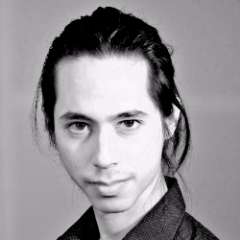Completed in 1985 and premièred in Mannheim in 2013, Mieczysław Weinberg's The Idiot is a true rarity. Seeing it revived for the first time, it's thrilling to see the opera given the vocal and musical treatment it desrves, lending a helping hand to its return from oblivion. The Bolshoi is to be thanked!
It would be all too easy to reduce Weinberg to no more than an imitator of Shostakovich (a title that is conferred on him by Tishchenko, amongst others). And while it’s true that his music provides the same latent tension and a thoroughly similar biting irony, the harmony Weinberg uses has something darker, something abstract, unafraid to borrow Bartók’s clothing. Weinberg has infused The Idiot with plenty of ideas. Also, one suspects that in matters of form, Weinberg was less fussy than his teacher: at the end of three hours of music, one keeps the impression of more writing that is freer, more fluid and consequently less predictable.
The essential of Dostoyevsky’s drama is in place. What the characters inevitably lose in psychological characterisation, they gain by means of dense and nervy dialogues, to the beat of frequent set changes. The staging is direct, effective, kept to the bare essentials. Evgeny Arye puts in plenty of energy: places and characters follow each other at high speed. Where others might throw in a gag or a visual trick, Arye keeps to the minimum – to the point, scenically, or dryness. There’s so little in the way of furnishing that the characters seem to inhabit a steel sanctuary: it’s mainly Galina Solovyova’s costumes that set the tone and place the story in its own era. Simon Pastukh’s sets are built around two spaces that are shifted around by a giant rotating wall. Everything on stage is black or grey; the singers’ reflect in mirrors on the side panels, a kaleidoscopic ambiance which effectively heightens animations on the back wall. With a touch of the silent film era, the projections show stylised avatars of the characters, while an imaginary movie crackles through loudspeakers.
Dostoyevsky’s novel was written in haste and is sometimes confused and incoherent. Arye has attempted to retain the extreme profusion of characters: a whole army of ladies in crinoline and gentlemen in top hats and sideburns come and go on stage, an effective collection of extras brave the snow (translucent curtains with falling snowflakes) as much as the sun, before lunching on the grass (the snowflakes transform into leaves). In black and then in white, deliberately interchangeable, the convulsions of the high aristocracy are clearly displayed to us, in a kind of mirror of the epileptic fits of the prince, which are never directly shown.
Bogdan Volkov purposefully curbs eloquence in order to concentrate on line and finds in this self-imposed restraint the mental fogginess of the young prince, thus creating a completely credible Myshkin. He’s not afraid to invest his vibrato with an agitated tremor, which one takes to be dictated by the character – a young prince, we should remember, who is subject to epilepsy, returning from a health trip to Switzerland. While he doesn’t completely achieve the stage presence of Gérard Philipe (in Georges Lampin’s film), his bearing is as dignified as it is emaciated, bringing to life the Christ-like nature of his character.
Ekaterina Morozova sings Nastassya Filippovna with quite admirable breath, authority and vocal style. The element of malice, which is so often missing and without which Nastassya Filippovna would be but a pale shadow, is firmly in place. Pyotr Migunov gives a perfect portrait of a modern rogue, bringing Rogozhin a crushing weight of personal presence. Migunov doesn’t pay so much attention to timbre and line as to a kind of primitive expressionism, which is totally appropriate in this case: he sings his role at full throat and brings unusual sophistication to the character. Amongst the ladies, the highly refreshing Yulia Mazurova, Elizaveta Ulakhovich and Yevgenia Segenyuk give us prettily plump voices and very dramatic vibrato, playing their part in the roles of Aglaya, Alexandra and Epanchina. Finally, honourable mentions are due to Konstantin Shushakov as a dashing Lebedev, and to tenor Ivan Maximeyko, who gives us a sensitive Ganya, with a clear and fluid line.
We’re also obliged to mention the Bolshoi orchestra and its conductor Michał Klauza, who produced an intricate filigree, finely calibrating the woodwind phrases and never overpowering the voices (goodness knows that the orchestra can easily go into saturation on this new Bolshoi stage). It’s an appropriate rendering of the qualities that Weinberg brought with such passion to this opera which, while short of a masterpiece, ranks alongside Denisov’s l'Écume des jours and Schnittke’s Life with an idiot as a missing link between the operas of Shostakovich and more recent Russian works.
Translated from French by David Karlin




